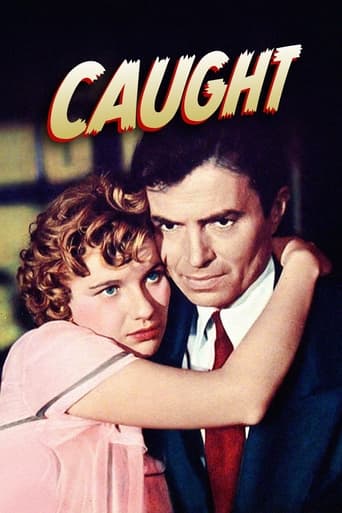Martin Bradley
The least typical of Max Ophuls' masterpieces, "Caught" is a Women's Picture, written with a steely edge by Arthur Laurents. Barbara Bel Geddes is outstanding as the girl who marries money in the shape of Robert Ryan's sociopath multi-millionaire, modeled so we are told on Howard Hughes, but he treats her with such contempt she runs away and gets a job as a receptionist to James Mason's struggling doctor. It's a triangle quite unlike other triangles in the movies of the time; there is a psychological depth at play here rare in a genre picture of its kind and both Mason and Ryan are superb while Ophuls' framing of the characters greatly enhances the relationships between them, (the distance between Ryan and Bel Geddes in his mansion, the close proximity between Mason and Bel Geddes in the office scenes).In lesser hands this might have simply been novelettish but it isn't the superficiality of the material that interests Ophuls but how he can manipulate the material so the film is all of a piece. The least typical of Ophuls, I said; perhaps not. Shot after wonderful shot reveals this to be the work of one of cinema's great stylists and it really shouldn't be missed.
SnoopyStyle
Poor innocent model Leonora Eames (Barbara Bel Geddes) meets arrogant volatile tycoon Smith Ohlrig (Robert Ryan). To spite his therapist, he marries Leonora without even being sure of her name. She is unhappy in their marriage but he is unwilling to grant her a divorce. She leaves her life of luxury to work as a receptionist in a doctor's office in the poverty-stricken lower east side. Smith pleads for her to return and she gets pregnant. It turns out that he hasn't changed one bit and he runs away to join Dr. Larry Quinada (James Mason) who she has fallen in love with.Barbara is doing a small performance as Leonora is a small personality. Her sweet middle-class nature is the perfect antidote to Smith. This is well made paperback romance movie. The start is a bit slow. It may be useful to introduce Dr. Quinada sooner. Maybe the movie can start with Dr. Quinada treating the models or simply be kind to Leonora. It would allow her a safe place to run away to the first time around.
TheMovieSmith
As a fan of film noir I was excited to find another movie to watch. Little did I know what I was in store for. The lead character was a prime example of a gold digger. I know that looking at a movie through the lens of the present day will distort the original work however I find it hard to believe that a normal woman in the 1940's could be that obsessed with 'bagging a rich one'. The main character spends the entire film whining about wanting to be rich all the while hating herself for being a gold digger (You can't have your cake and eat it too). I know they wanted to make her seem naive but it completely backfired. She is just a horrible woman and has no redeeming value whatsoever as a character. The performances seem dry and forced; absolutely no chemistry between Leonore and the doctor. There is even less chemistry between her and Smith. I find it hard to believe she could have ever fooled herself into loving him (as she claims in the film). Smith is also the prime example of a terrible man and is quite possible a worse human than her. Marrying her just to spite his doctor and then ruling her life at every turn. He is however more believable at being a cad then she is as a gold digger. In a movie full of garbage the most insulting thing to contemplate is that a 'happy ending' (complete with an uplifting score) is the woman's child being still born. After pleading with her husband not to take her baby away from him she is relieved to have the baby die so she can be free to marry the doctor she loves, a doctor (pediatrician) which is just as happy to have the baby and husband out of the picture so he can finally have his one true love. Mindless dribble at its finest. All in all the film is an early example of tawdry soap opera complete with terrible acting and a crummy plot.
Spikeopath
Caught is directed by Max Ophüls and adapted to screenplay by Arthur Laurents from the novel Wild Calendar written by Libbie Block. It stars Barbara Bel Geddes, Robert Ryan, James Mason, Frank Ferguson and Curt Bois. Music is by Frederick Hollander and cinematography by Lee Garmes. Seeking to make a comfy nest by marrying a rich man, Leonora Eames (Geddes) snags more than she bargained for when Smith Ohlrig (Ryan) becomes the man of her life. And then circumstance brings Doctor Larry Quinada (Mason) in to her life and things will never be the same again... Psychological swirls a go go in this fine piece of work. Story was changed somewhat by Ophüls after he was brought in as a last directing throw of the dice. Softening the harsh edges of Leonora's original persona on the page, he brings about a sort of piggy in the middle scenario. On one side she has a tyrant control freak of a husband, on the other she has a good honest gentleman doctor keen to impart his love to her life. It sounds an easy choice to make, but circumstance, the vagaries of noirish fate - of life affirming decisions, doesn't make this a straight forward narrative piece. Smith Ohlrig is based on Howard Hughes, who surprisingly didn't kick up too much of a fuss once the word got out. This is one troubled character, mean and controlling, superbly portrayed by a chilling Robert Ryan, it's just a pity there isn't time in the piece for more of Ryan's forceful nastiness. The best scenes feature Ryan, the shamble of the marriage is adroitly filmed by Ophüls around the gloomy Ohlrig mansion, with reverse shots, perception tinkerings and isolated shadow play emphasising the relationship from hell - the impact of Lee Garmes' (Nightmare Alley) photography and the art direction of Frank Paul Sylos (The Great Flamarion) also not to be under estimated. Leonora is a well written character, it would have been easy to have her as weak willed and spineless, but there's a strong feminist bent afforded her by the makers, giving her some guts and intelligence to off set the desperate situation she will find herself in later in the play. Geddes ticks all the right boxes for the emotional requirements of the role, never over doing the histrionics. Mason saunters into the pic with a grace and elegance that made the American market sit up and take notice, a class act and he fits the role perfectly. Ophüls steers this one admirably throughout, arriving at a culminating finale that's guaranteed to make you have conflicting feelings. 8/10




